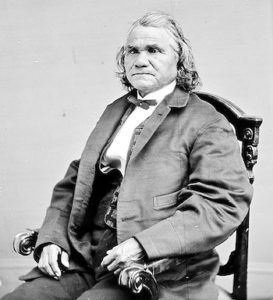
Stand Watie
*Stand Watie was born on this date in 1806. He was a Native American Cherokee Chief, slave owner, and military officer.
From Rome, Georgia, he was also called De Gata Ga (Cherokee: “Stand Firm”). At 12, he was sent to a mission school where he learned to speak English. He later helped an older brother publish the Cherokee Phoenix, a tribal newspaper. In 1835, Watie joined three other Cherokee leaders in signing the treaty of New Echota, surrendering Cherokee lands in Georgia. This forced the tribe to move westward into Indian Territory (now Oklahoma). On the same day in 1839, all three other signers were murdered, but Watie escaped death and remained the leader of the minority, favoring the treaty.
In 1861, Watie raised and commanded the first volunteer Cherokee regiment, the Cherokee Mounted Rifles, mustered into the Confederate Army during the American Civil War. Appointed a colonel by the Confederacy, he was promoted in 1864 to brigadier general after many engagements as a raider and cavalry commander in and around Indian Territory. He was especially active in destroying the fields and other property of Native Tribes backing the Union. Watie remained loyal even after the majority party of the Cherokee in 1863 repudiated the 1861 alliance with the Confederacy. He commanded Southern troops in the Indian Territory, which consisted of battalions of Creek, Seminole, Cherokee, and Osage natives.
Dr. Arica L. Coleman, a nationally recognized historian of Black and Native American descent, said, “What people need to realize is that slavery was not just Black and white,” Coleman, who has held numerous faculty appointments, is the author of “That the Blood Stay Pure: African Americans, Native Americans and the Predicament of Race and Identity in Virginia.” “Slavery in Indian territory became a mirror image of slavery in the white South,” said Coleman.
She further explained there were already established slave codes within native territories dating back to the 1827 Cherokee Constitution, which stated, “The descendants of Cherokee men by all free women, except the African race, whose parents may have been living together as man and wife, according to the customs and laws of this Nation, shall be entitled to all the rights and privileges of this Nation, as well as the posterity of Cherokee women by all free men. No person who is of negro or mulatto parentage, either by the father or mother side, shall be eligible to hold any office of profit, honor, or trust under this Government.”
“There were even Black Codes to keep in line the free Black populace, given there was a free Black population living among the Cherokees, Choctaws, Creeks, and other groups,” added Coleman.
Once in Indian Territory, Watie and other native slave owners resumed their practice. Watie, a staunch Confederate whose loyalty and battlefield exploits had earned him the rank of brigadier general, was among the last of all Confederate officers to surrender, not doing so until June 23, 1865. After the Civil War, Watie went to Washington, D.C., to represent the southern Cherokee. He spent his final years as a planter and businessman and assisted in collecting Cherokee tales and legends. His life exemplifies the intersectionality of capitalism, race, and humanity practiced by some Native Americans.
Stand Watie died September 9, 1871, in Honey Creek, Indian Territory, now Oklahoma.